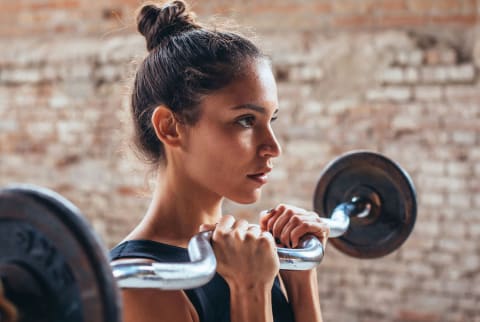Advertisement
5 Things You Should Know About Testosterone In Women, From An MD


Testosterone is quite the misunderstood hormone, probably because there isn't much education about hormones outside of stereotypes in general. However, we're here to help change that, just a little bit.
To come, five things you may not know about testosterone in women, from Harvard-trained board-certified internal medicine physician and chief medical officer at Modern Age Anant Vinjamoori, M.D.:
It's not solely a "male hormone"
It's no secret that many people associate testosterone with male rage and muscle building. However, it's not just a male hormone, and it has many more functions in the body than you might think.
"In reality, it's the most abundant hormone in a woman's body1 and begins to decline in most women by their mid-30s, well before estrogen and progesterone," Vinjamoori says. However, the latter two hormones are most often discussed in relation to women's health, leaving testosterone out of the conversation.
As we'll cover below, testosterone plays a large role in the physical and mental health of women and people assigned female at birth (AFAB), so it's worth taking into account when discussing hormone balance and hormone health.
It doesn't just impact sex drive and muscle gains
This hormone impacts many bodily functions. Below, Vinjamoori explains a few of the most important testosterone functions in women:
- Glycemic Control: "Large studies (though primarily in men) have shown a direct correlation between testosterone levels and lower hemoglobin A1c2, indicating better glycemic control."
- Cognitive regulation: "There are a number of research studies that suggest that testosterone has a positive impact on multiple aspects of brain function—including memory3."
- Bone Health: "There is also fairly strong literature suggesting that maintaining healthy testosterone levels can promote stronger bones and a reduced risk of fracture later in life4."
- Libido: "Testosterone plays a key role in driving libido for women, and its age-related decline can be associated with a lower libido as well."
Fact: You can be deficient in testosterone
Much of the hormone-balancing conversation in women's health focuses on estrogen and progesterone, but balance is needed with testosterone as well. In fact, you can even be deficient in testosterone, which Vinjamoori sees quite often in women over 30.
"Testosterone levels often start to decline in women by their mid-30s, which is earlier than the decline in other hormones like estrogen and progesterone, which typically happen for most women in their mid-40s."
Common symptoms of low testosterone in women include:
- Mood swings
- Low energy
- Motivation struggles
- Midsection weight gain
However, these symptoms can be applied to many other health conditions, so it's important not to jump to conclusions. That being said, if you have noticed these symptoms and struggle to find answers, a testosterone test may be worth discussing with your health care provider.
Birth control can change testosterone function
If you are concerned about testosterone balance, you'll want to start by making sure any medication you take isn't impacting your testosterone levels. Or, if it is, make sure you know that your hormone levels may not be able to be accurately measured because of it.
One common medication that can interfere with testosterone measurement (and hormone measurement in general) is oral birth control pills, so make sure you take that into account when looking at results from testosterone tests.
"The suppression of testosterone is often a downstream effect of birth control's inhibition of gonadotropin-releasing hormone (GnRH) from the hypothalamus and luteinizing hormone (LH) from the pituitary gland, which are hormones crucial for the natural production of testosterone," Vinjamoori explains.
This mechanism may be beneficial at times, like when treating severe hormonal acne but may not be for everyone.
PSA: There are ways to support it naturally
Hormone replacement therapy may be an option for some women who have testosterone deficiency, but that doesn't have to be the first step when it comes to balancing this hormone. Instead, look to a combination of lifestyle factors.
"To naturally promote healthy testosterone levels, two of the most effective strategies are high-quality sleep and resistance training5," Vinjamoori says.
You may also look to DHEA supplements. "The body synthesizes DHEA before converting it to testosterone, making it a reasonable choice for supplementation," Vinjamoori says. However, it's best to consult your health care provider before starting this supplement to ensure it's a necessary part of your routine.
The takeaway
Stereotypes aside, testosterone balance is an important part of women's health. This hormone impacts physical and mental health and may even be an undiagnosed deficiency in women over 30. To support your testosterone levels, prioritize sleep, try resistance training, and consider DHEA supplementation if recommended by your health care provider. Here, more on hormone balancing 101.


















